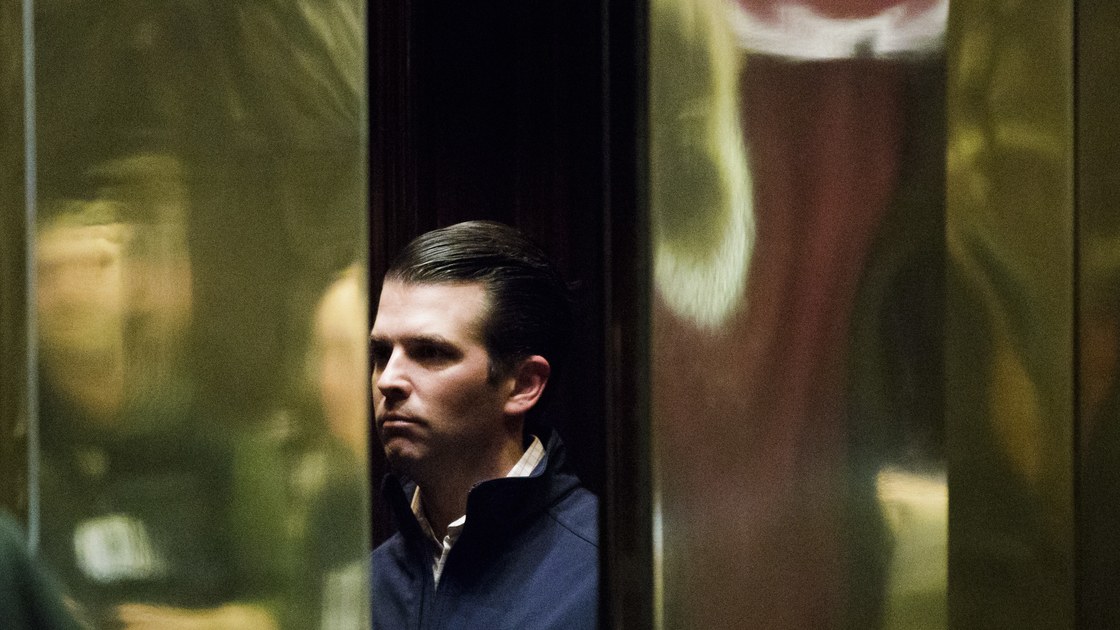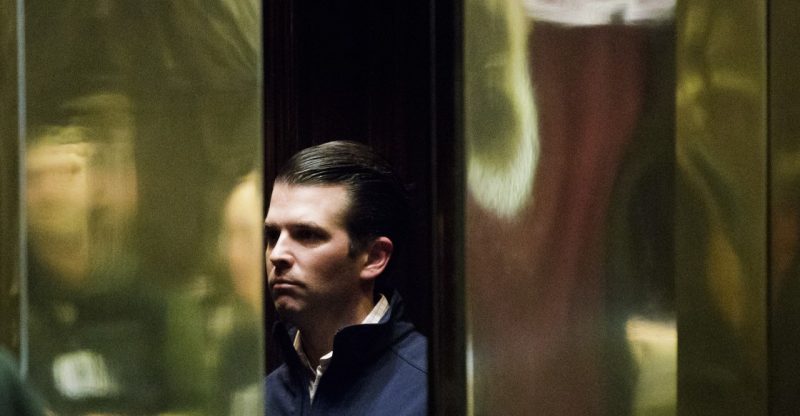Is Donald Trump, Jr., Taking the Fall for the White House?

It looks like Alan Futerfas, the criminal-defense lawyer whom Donald Trump, Jr., hired on Monday, is going to be busy. Following Trump, Jr.,’s decision on Tuesday to release a series of bombshell e-mails about his meeting with a well-connected Russian lawyer, the White House—including President Trump—appeared content to let him be the fall man for the whole incident. In fact, the events of the day made it impossible to rule out that Trump, Jr., was willingly assuming this role.
The e-mails, most of which were messages between Trump, Jr., and Rob Goldstone, a British publicist whose clients included a Russian oligarch with ties to the Kremlin, have become global news for an obvious reason: it isn’t normal practice for the potential subject of a criminal inquiry to release likely incriminating documents before he has even been interviewed by the authorities.
To be sure, it remains to be seen (and proved) whether Trump, Jr., broke any laws in agreeing to meet with Natalia Veselnitskaya, the Russian lawyer, after Goldstone dangled the prospect of “very high level and sensitive information” that was “part of Russia and its government’s support for Mr. Trump.” But while “collusion” is not a term that appears in the relevant criminal codes, there are at least two felony charges that the Feds could potentially hit Trump, Jr., with, some legal experts said on Tuesday: conspiracy to commit election fraud, and conspiracy to obtain information from a foreign adversary.
“It’s a shocking admission of a criminal conspiracy,” Jens David Ohlin, the associate dean of Cornell Law School, told the Washington Post. “The conversation will now turn to whether President Trump was personally involved or not. But the question of the campaign’s involvement appears settled now. The answer is yes.”
Trump, Jr.,’s defenders still contest that. On Tuesday, however, there was a conspicuous absence of Trump Administration officials and surrogates repeating the claim that Reince Priebus, the White House chief of staff, made just a few days ago, when he declared that news stories about the June 9, 2016, meeting between Trump, Jr., and Veselnitskaya at Trump Tower were “a nothingburger.”
Instead, the message from the White House was that Trump, Jr., was a fine young fellow—actually, he’s thirty-nine—and that all questions about his unfortunate predicament should be directed to Futerfas. At a briefing with reporters, Sarah Huckabee Sanders, the deputy White House press secretary, read out a statement from the President that said, simply, “My son is a high-quality person and I applaud his transparency.”
That was it. There was no declaration that Trump, Jr., hadn’t done anything wrong, nor a tweet barrage attacking the Times and other “fake news” outlets reporting on the story. And no further information. When reporters pressed Huckabee Sanders on when the President had learned about the June 9th meeting, she said that she didn’t know. When she was asked when was the last time that Trump had spoken with his son, she delivered the same answer. And when she was asked, in reference to the meeting, “How is that not collusion?” she replied, “Not to sound like a broken record, but, on all questions related to this matter, I would refer you to Don, Jr.,’s counsel and outside counsel.”
Apart from reading out the statement from Trump, the one piece of information that Huckabee Sanders conveyed was that the White House was still standing by what she had said on Monday: “Our position is that no one within the Trump campaign colluded in order to influence the election.”
The phrase “within the Trump campaign” bears inspection, and it may well hold the clue to the whole thing. On March 17th, the former F.B.I. director James Comey told Congress that the F.B.I. was “investigating the nature of any links between individuals associated with the Trump campaign and the Russian government and whether there was any coördination between the campaign and Russia’s efforts.”
Trump, Jr., didn’t have a formal title within the Trump campaign, and he isn’t a member of the Trump Administration. In the emerging White House narrative, that makes him an outsider—a well-connected freelancer who wasn’t speaking or acting on behalf of his father or the campaign when he agreed to meet with Veselnitskaya.
Even if the White House can manage to convince anybody of this, which seems unlikely, it would still face a huge problem: two other people who attended the June 9th meeting were Paul Manafort, who was then the manager of the Trump campaign, and Jared Kushner, Trump’s son-in-law, who is now one of the President’s closest advisers in the White House.
Partly because of all the revelations about the highly paid work he did for pro-Russia interests in Ukraine, Manafort is already in a deeply compromised position. Kushner, too, is in a spot. In filling out official forms to obtain security clearance when he joined the White House, Kushner reportedly failed to disclose a number of meetings he’d had with foreign officials, including the June 9th one, and one he had in December with a well-connected Russian banker.
The line that Trump, Jr., gave to the Times over the weekend was that Manafort and Kushner didn’t know whom they were meeting at Trump Tower. “In his statement, Donald Trump Jr. said he asked Mr. Manafort and Mr. Kushner to attend, but did not tell them what the meeting was about,” the Times reported on Sunday.
To me, at least, this seems like a thin reed on which to construct a theory of deniability for the Trump campaign and the Trump White House. It also seems hard to believe, as Trump, Jr., also claimed, that his father knew nothing about the meeting even though it took place just one floor below his suite, and he was reportedly in Trump Tower on that day. But desperate times call for desperate measures, including, it seems, letting the President’s son carry the can.






